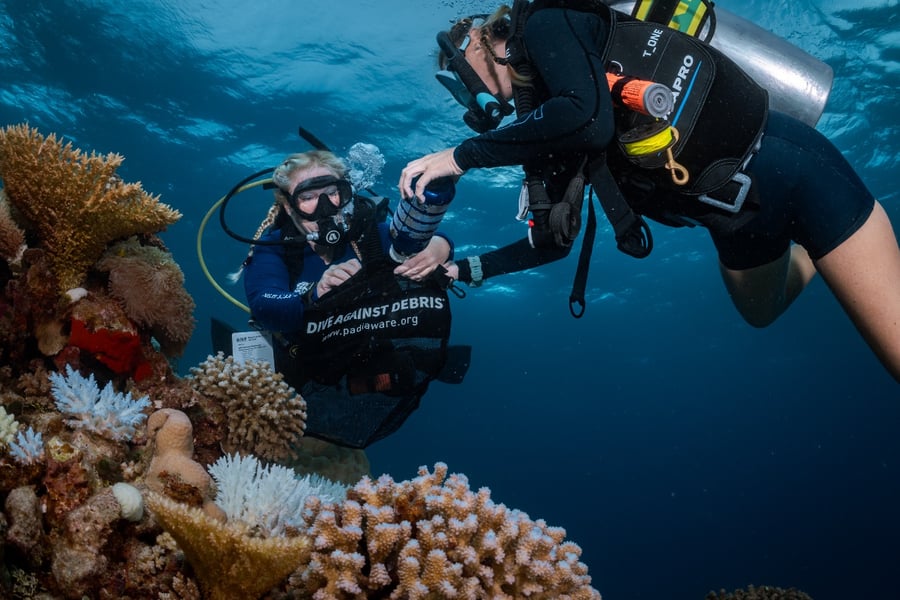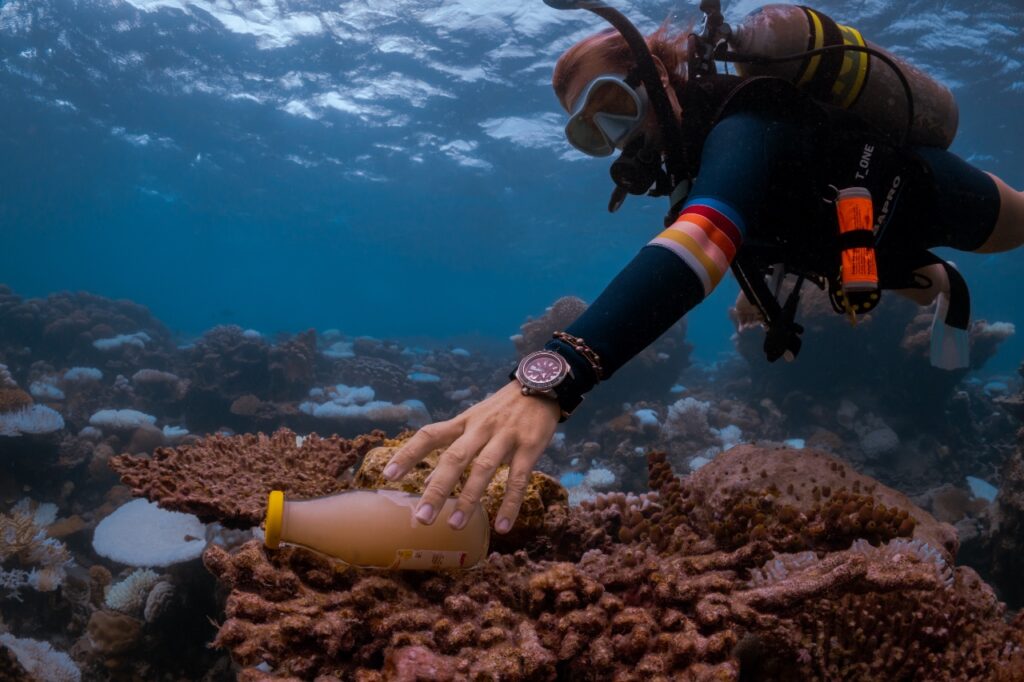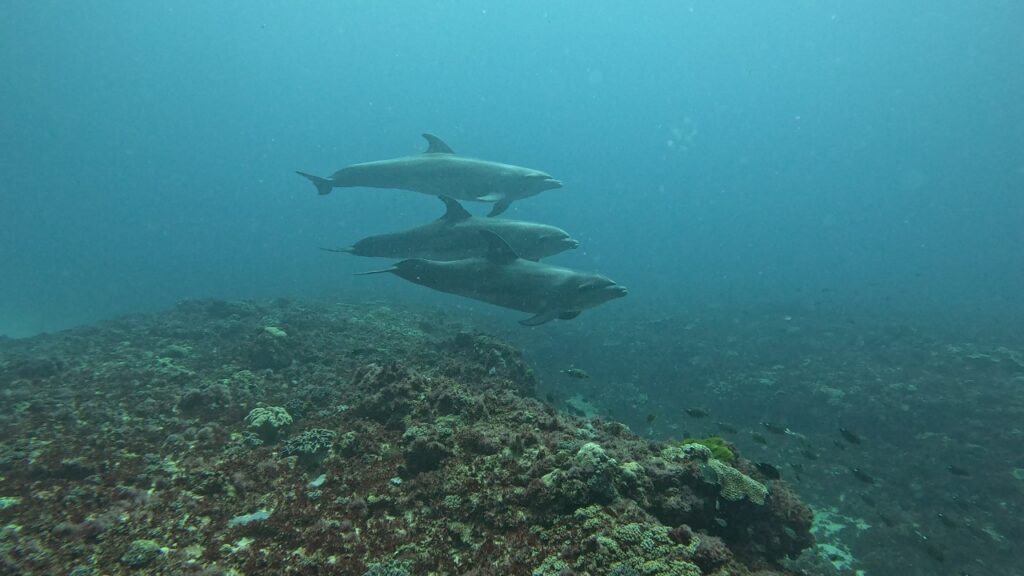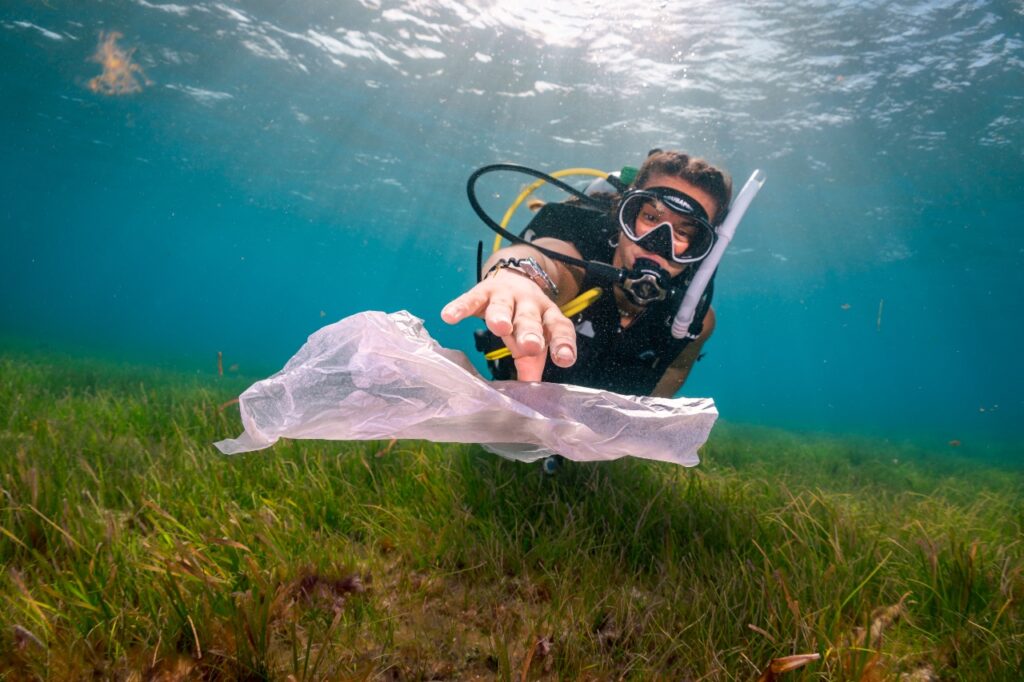A cocaine baggie. A toilet brush. A replica of the deadly Squid Game doll. A drone. A glass bottle from hundreds of years ago.
It’s not, as you might envision, the ingredients for some kind of unhinged drinking game. Instead, these are all items which scuba divers have recently found lurking beneath the surface of Sydney’s beaches.
The perception that Australia’s oceans are beautiful, crystal clear, and pollution-free is somewhat at odds with the reality when you go a little deeper. Looking at images of our glorious coastlines — from the virtually untouched Lord Howe Island in the east, to the dreamlike Ningaloo Reef to the west, and even the packed shores of Bondi Beach, beamed around the world via Bondi Rescue — it’s easy to form the view that the plastic problem is an international one. Right?
Wrong.
A Toilet Brush to the Head
Diving 14 metres down at Sydney’s Gordons Bay last year, I was hit in the head with a toilet brush.
Growing up with the ‘terrifying, shark-infested waters’ narratives that surrounded us in the Nineties, there was instant relief that the thing that hit me was a ‘harmless’ toilet brush, and not something with razor-sharp teeth. Indeed, a SEA LIFE Sydney study in 2020 found that 72 per cent of Australians are scared of sharks.
Love Music?
Get your daily dose of everything happening in Australian/New Zealand music and globally.
Once the unnecessary shark panic passed, new thoughts entered: How did that get here? What grub takes a toilet brush to the beach, and then leaves it there? I’m going to have to touch the toilet brush and take it up to the surface and put it in the bin, aren’t I?
I was then hit by the rational realisation that someone probably didn’t place a toilet brush under the sea on purpose. They probably didn’t take it to the beach at all.
So, should we in fact be more scared of the toilet brush than the lurking apex predators beneath the surface?
Plastic is, after all, a far more serious and sinister problem for our food chain, our oceans, our planet. It’s so pervasive it’s even been found in our brains (unlike, say, White Sharks, which have not).
Tom Burd, who leads the day-to-day fieldwork in Sydney Harbour for the Sydney Institute of Marine Science (SIMS), confirms that the toilet brush’s journey — and indeed that of the cocaine baggie, Squid Game doll, drone, and historical bottle — is not unique.
It can be as simple as a tipped-over bin, a rubbish bag that gets ripped open, or a careless picnic in a park. All things lead back to the ocean, eventually.
Indeed, in late March, outrage abounded after a reserve near Sydney’s Camp Cove was left trashed after over 300 visitors partied with abandon, before abandoning their litter. It was a devastating sight for Burd, who has been working on restoring the nearby underwater environment.
“There’s clearly a huge lack of consideration, lack of education, in varying age groups.” —Tom Burd, Sydney Institute of Marine Science
“There was rubbish over every square metre of the ground there after that party. The next day it looked like Glastonbury Festival. It was disgusting. There’s clearly a huge lack of consideration, lack of education, in varying age groups. For that to happen in this day and age, in the middle of Sydney, for people to think it’s okay to have this party and trash the place and leave rubbish everywhere is just completely unacceptable. These are the conversations we need to be having. Everybody needs to be taking responsibility for the Harbour,” he tells Rolling Stone AU/NZ.
The impact will far outlast the outrage.
“It’s a tough one, because that’s our restoration site — it’s where we’re trying to bring kelp back and bring animals back to live in a kelp forest again. And knowing the way the site’s constructed underwater, I know deep down that there’s going to be rubbish down there forever amongst those boulders from that one night.”
Alex Blake, a marine biologist and dive instructor, has also seen his share of underwater urban pollution while leading ocean clean-up initiatives with Dive Centre Bondi, but the issue is far wider and deeper than the Harbour.
“We did find a lot of marine pollution in the Great Barrier Reef,” he says of his time working on the world’s largest living structure, citing boating material such as buoys and nets as a large issue.
“Even when we were at the outer Reef, we were finding plastic trash almost every day — this is about 50 to 60 kilometres off the coast of the mainland. Even out there, we would still find things underwater. We would find plastic bottles. A lot of plastic bags. I pulled a plastic bag out of the mouth of a sea turtle, which is a little bit scary, but also just very lucky that I happened to be there at the time. God knows how many bags it had eaten before I got there.”
So, Is It Too Late?
Australia’s national science agency, the CSIRO, worked with the University of Toronto last year, and determined that there’s likely up to 11 million tonnes of plastic pollution sitting on the ocean floor. That would be bad enough, but it’s not a problem that’s stagnating. Every minute, a garbage truck’s worth of plastic enters the ocean, the research said. And plastic use is expected to double by 2040.
The plastic problem is just one crisis facing the ocean. At the time of writing, it was declared that the Great Barrier Reef was suffering from widespread coral bleaching, for the second year in a row. The Reef Snapshot: Summer 2024-25 report, published in April by the Great Barrier Reef Marine Park Authority, noted that the event is the sixth since 2016, and the second time back-to-back widespread bleaching has occurred (after the consecutive events of 2016 and 2017).
The catastrophic news should be cause for alarm. And it is — for some.
“Without the ocean, we would have burned alive by now. It’s struggling. So I do wish people saw what an amazing system it is.” —Dr Yolanda Waters, CEO, Divers for Climate
“I wish people knew how important the ocean is,” says Dr Yolanda Waters, social scientist and CEO of Divers for Climate. “Without the ocean, we would have burned alive by now. The ocean absorbs so much of that excess heat that we’re causing because of burning fossil fuels. The ocean is helping us. It’s our hero, and it’s getting to that point now where it’s taking on so much of that burden. It’s struggling. So I do wish people saw what an amazing system it is.”
Others, perhaps, feel they have heard it all too much before. They try to do their bit, but governments, corporations, billionaires, and those who could actually affect change don’t seem to be doing theirs. So why bother?
Adriana Vergés is a Professor in Marine Ecology at UNSW Sydney and SIMS.
“We did a survey where we asked Sydneysiders whether they thought water quality was getting better or worse in the last 20 years, and 70 per cent of people thought it was getting worse,” she tells Rolling Stone AU/NZ, noting that water quality in Sydney has actually vastly improved since the Eighties.
“And I think that incorrect perception leads to people getting to a point where they think that they have no agency, where there’s nothing they can do. They think it’s a lost cause and it will only get worse. And that leads to despair.
“Whereas I think if people actually realised how many good initiatives are happening, it would inspire people to think creatively about other things that we can all collectively do. I don’t want people to think everything is fine and getting better. Overall, we are facing a very dramatic crisis, but there’s lots of examples of things getting better that we’re not appreciating enough. And it’s hard to get collective action when people lack the motivation.”
“We are facing a dramatic crisis, and it’s hard to get collective action when people lack the motivation.” —Adriana Vergés, Professor in marine ecology at UNSW Sydney and SIMS
Waves of Hope
Between the unfathomable amounts of plastic entering our waterways everyday, the bleaching Reef, the climate crisis that governments seem incapable or unwilling to deal with, billionaires blasting off into space for joyrides, and the general apathy or despair gripping people about how to play their part, you might think it’s impossible, or at least unreasonable, to hold onto hope.
SIMS’ Burd, however, is both frustrated and optimistic.
“Pollution in the plastic sense is just another contributing problem to all of the other elements which are already impacting the habitats which we work with and which we enjoy as recreational divers. It’s just another factor which is adding on top of a lot of other pressures. It has an impact, but it’s about trying to remove as many pressures as possible. And this is a really easy one that we can take action on as individuals by making sure that we dispose of our items properly, and try to purchase items which we know are not easily recyclable or not recyclable at all, trying to reduce those single-use plastics — obviously we still see quite a lot of those. One of the things I see quite a lot are those little soy sauce fishes. They’re a classic one that’s out there. After a while they’ll get broken and sink to the bottom,” he says.
“So I think people need to be aware that every item they use in their everyday life has to go somewhere. And for a lot of these items, it can be into water — whether that’s their own fault directly for not disposing of it properly, or a lack of systems in place to deal with that waste properly.”
Dr Waters is also aware of the inescapable and intersecting nature of these problems. She notes that scuba divers and dive tourism operators are on the frontline of climate change and ocean changes. They, more so than any politicians making policy on the matter, see the impacts day-to-day, week-to-week, month-to-month, and year-to-year. But they also rely on optimism, on people wanting to see the underwater environment, and on people believing it’s worth seeing and saving.
“In Australia, we have 170 climate groups trying to fight for more ambitious climate action, but only three — and this includes us — are dedicated to the ocean, which is wild. So we’re just trying to get our foot in there and tell these frontline stories and advocate for federal policy on climate action. People are doing so much on the ground, so we’re trying to be that voice for more systemic change in that bigger national and global action against climate change,” she says.
“Unless you’ve got your head underwater, you wouldn’t know, because it looks the same from above and from the surface, most of the time. It looks beautiful and pristine. And it’s exciting too, if you’re jumping in for the first time, but it’s those divers who have been in the water for so long who are seeing these just drastic changes that otherwise, you would never know about.”
Dive Centre Bondi’s Blake knows the reality under the water too, but he’s inspired by the community days the Centre hosts, in which divers, snorkellers, and land foragers come together to clean up marine environments, collate data, and inspire action.
Dive Against Debris is PADI’s (the Professional Association of Diving Instructors) flagship citizen science program, which has helped the professional dive group create the world’s largest underwater marine debris database. The AWARE Foundation then uses this data in the hopes of influencing government policies that they believe will be key to solving the plastic problem.
So far, via partner dive centres around the world including Dive Centre Bondi, Dive Against Debris events have removed and reported over 3.6 million pieces of plastic from the ocean, and released more than 37,000 entangled marine animals from human-induced marine debris. PADI and the AWARE Foundation say they are buoyed by recent successes such as Vanuatu banning plastic bags, and informing single-use plastic policies in Manly in Sydney after Dive Centre Manly shared Dive Against Debris data from their clean-ups.
“Most of the best experiences I’ve ever had in my life have been underwater,” Blake explains.
“But also you do see some things that are a little bit sad, a little bit disappointing. You see the effects of fishing materials. I’ve found fish with hooks stuck in them in various states, some of them are living with the hooks stuck in them, other ones are very close to death, or just dead, because of hooks. I’ve cut lots of fish out of nets, like shark nets for example, in the Sydney Harbour, and at Bondi I’ve cut fish out of those nets. We’ve found a lot of plastic pollution on our Dive Against Debris dives — a lot of different things that have just been recklessly thrown off boats or have just ended up there, washed there by the currents.”
Vergés can also see the tangible impacts of the projects and initiatives being driven by SIMS.
“A lot of the work that I do, restoring underwater forests, I actually get to see the results. Things in the marine environment turn around faster — so when I restore an underwater forest, I can see the results within a year or two. Whereas if I was working on land, I would have to wait many decades or a century to see the forest back, right? So we actually get to see how, when we do the right thing, nature kind of reverses the trend, from decline to recovery pretty fast. So if we do the right things, I know that we can reverse the trend of environmental decline that we’re on. So that keeps me optimistic.”
“If we do the right things, I know that we can reverse the trend of environmental decline that we’re on. So that keeps me optimistic.” —Adriana Vergés, Professor in Marine Ecology at UNSW Sydney and SIMS
Everyone interviewed for this piece shared a vision for a world where more people knew the dangers, and the beauties, of what’s actually lurking beneath the surface.
“My whole life has revolved around being underwater,” Blake says. “I think in a way, becoming a scuba diver, becoming a marine biologist, has opened up the world to me. It’s made me able to access the two-thirds of the world that most other people are not even able to see at all, which is really, really cool. It’s taken me all over the world. I couldn’t imagine my life being anything other than underwater. I just wish more people could see it.”
This feature is in the June-August 2025 issue of Rolling Stone AU/NZ. If you’re eager to get your hands on it, then now is the time to sign up for a subscription.
Whether you’re a fan of music, you’re a supporter of the local music scene, or you enjoy the thrill of print and long form journalism, then Rolling Stone AU/NZ is exactly what you need. Click the link below for more information regarding a magazine subscription.






































